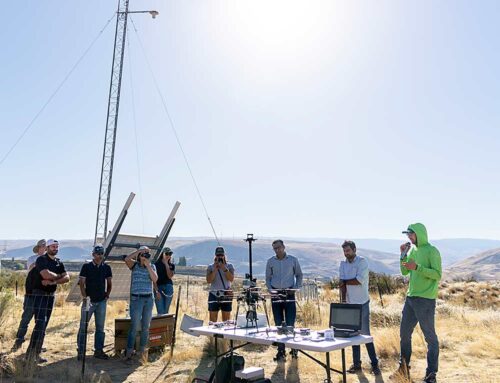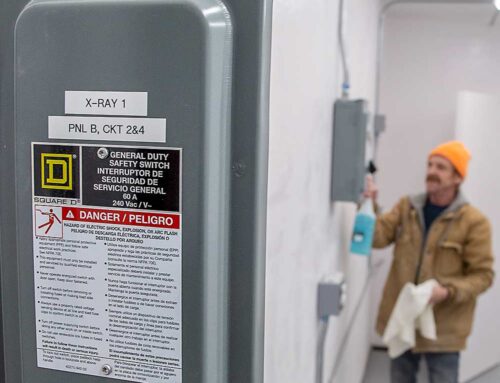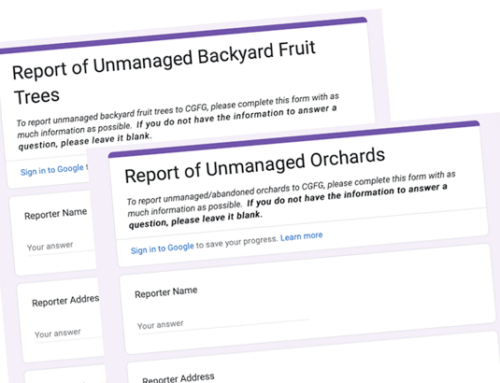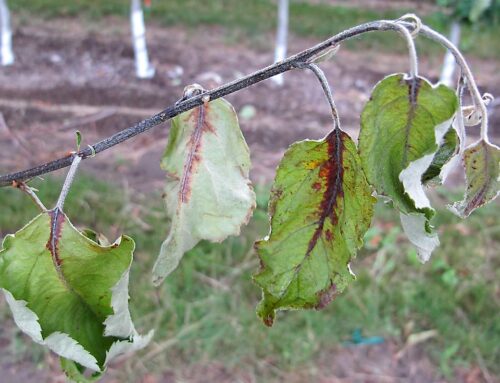A national team of 35 scientists from 14 U.S. universities and agencies has received a $10 million grant that will build on the foundation laid by the $14 million RosBREED project.
Like the original RosBREED, RosBREED 2 will be managed by Dr. Amy Iezzoni, the tart cherry breeder at Michigan State University. Co-project director is Dr. Cameron Peace at Washington State University. The project was funded at $2 million a year over five years through the Specialty Crop Research Initiative with new money authorized by the 2014 Farm Bill.
“A lot of progress was made during RosBREED in finding major loci for fruit quality traits and developing DNA tests so we know when plants have them,” Iezzoni said. “Now we want to use this knowledge to breed high quality fruit varieties with disease resistance.”
In the past, she said, rosaceous crop breeders have responded to the need for genetic solutions by using disease resistance from wild or unadapted germplasm. “Few have achieved commercial success because of difficulties breeding cultivars with both high fruit quality and disease resistance,” she said.
This project addresses this need, she said, “through a national coordinated effort that will enable breeding programs to routinely apply modern genomics and genetics tools to efficiently and effectively deliver cultivars with producer-required disease resistances and market-essential horticultural quality.
“Now, with DNA tests, we have a game changer,” she said. Using them to identify seedlings carrying desirable traits—without waiting to taste the fruit—will greatly speed up the breeding process, and it will allow more generations to be developed quickly to enhance fruit quality.
Titled “RosBREED: Combining Disease Resistance with Horticultural Quality in New Rosaceous Cultivars,” the project will involve eight crops—apple, blackberry, peach, pear, rose, strawberry, sweet cherry, and tart cherry. Blackberries, pears, and roses are new additions, bringing new breeding programs under the RosBREED umbrella.
A team of plant pathologists will join breeders in this new RosBREED venture. The pathology team leader is Jay Norelli at the USDA Agricultural Research Service Appalachian Fruit Research Station in Kearneysville, West Virginia.
Researchers there work with pears, peaches, and plums and have developed a breeding approach called FasTrack, in which plums have been induced to flower and set fruit at less than a year of age, greatly shortening generation times in breeding.
The pathology team will include Dr. Guido Schnabel at Clemson University, who has worked extensively with Armillaria on peaches, and strawberry disease expert Dr. Kelly Ivors at California Polytechnic State University at San Luis Obispo.
The virtual who’s who of apple, peach, cherry, and strawberry breeders in the previous RosBREED effort will also be augmented by breeders working on pears, roses, and blackberries.
“RosBREED brings unprecedented attention to local and regional breeding programs and a commitment to more efficiently, accurately, and creatively develop commercial scion and rootstock cultivars,” according to the press release announcing the new funding.
“The team will build on the foundation established in the preceding RosBREED project, now adding key new scientists and targeting diseases industry stakeholders across the country have identified as key challenges. Using modern DNA tools, U.S. breeders will now be able to more rapidly develop cultivars with disease resistance combined with superior horticultural quality.”
Diseases the breeders intend to target include:
—In apples: apple scab, fire blight, and blue mold.
—In pears: fire blight.
—In peaches: brown rot, bacterial spot, and Armillaria root rot.
—In sweet cherries: powdery mildew.
—In tart cherries: cherry leaf spot.
—In strawberries: angular leaf spot and root and crown rots.
—In roses: black spot.
Armillaria will be targeted in all the stone fruits.
“We’re really excited about this project,” Iezzoni said. “Growers in my industry are really sick of these diseases. When I look at the size of the spray bill, I think, ‘This is crazy.’”
The public, too, would like to see less use of fungicides. “Producers will have more options to sustainably protect their crops, while consumers and the entire supply chain will directly benefit from products with better taste, nutrition, keeping ability, and appearance,” the press release said.
There is second facet to this project. It will build an online database called the “Genome Database for Rosaceae,” giving researchers and breeders access information on genes and their locations. Dorrie Main at Washington State University is project director for the database.
As in the original RosBREED project, information will be shared through a website and by communications specialists. Iezzoni expects to build on the RosBREED website, adding a section on the pathologists’ work.
Mercy Olmstead, a stone fruit extension specialist and assistant professor with University of Florida, will be the extension outreach specialist for all of the science advances coming out of the project, sharing them with other scientists and the public.
Kathryn Stofer, a research assistant professor with the Agricultural Education and Communication Department at Washington State University, will work with the database project.
Breeding programs included under RosBREED include apple breeding at Washington State University, Cornell University, University of Minnesota, and the USDA-ARS station at Kearneysville; peach breeding at Michigan State University, University of Arkansas, Texas A&M University, Clemson University, and University of California, Davis; pear breeding at Kearneysville; prunus rootstock breeding at Michigan State and Clemson; sweet cherry breeding at Washington State; tart cherry breeding at Michigan State; rose breeding at University of Minnesota; blackberry breeding at University of Arkansas and USDA-ARS in Corvallis, Oregon; and strawberry breeding at Michigan State, University of New Hampshire, University of Florida, USDA-ARS Corvallis, and Washington State University. •






Katie Stofer is actually at UF, not WSU.